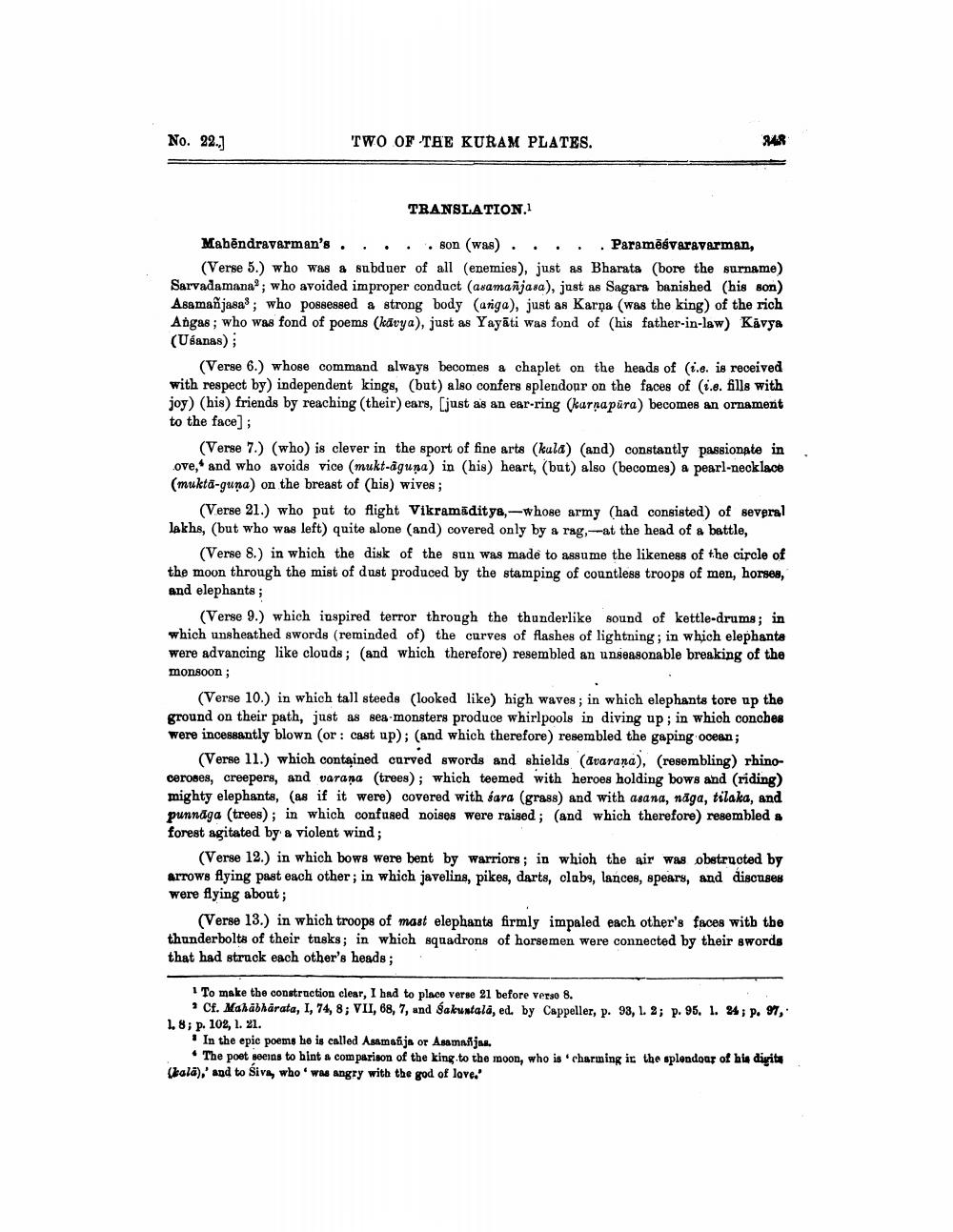________________
No. 22.]
TWO OF THE KURAM PLATES.
348
TRANSLATION.
.
Mabēndravarman's.....son (was)..... Paramēsvaravarman,
(Verse 5.) who was & subduer of all enemies), just as Bharata (bore the surname) Sarvadamana'; who avoided improper conduct (asamañjasa), just as Sagara banished (his son) Asamañjasa; who possessed a strong body (ariga), just as Karpa (was the king) of the rich Angas; who was fond of poems (karya), just as Yayāti was fond of (his father-in-law) Kavya (Uganas);
(Verse 6.) whose command always becomes a chaplet on the heads of (i.e. is received with respect by) independent kings, (bat) also confers splendour on the faces of i.e. fills with joy) (his) friends by reaching (their) ears, (just as an ear-ring (karnapura) becomes an ornament to the face];
(Verse 7.) (who) is clever in the sport of fine arts (kula) (and) constantly passionate in ove, and who avoids vice (mukt-aguna) in (his) heart, (but) also becomes) a pearl-necklace (mukta-guna) on the breast of (his) wives;
(Verse 21.) who put to flight Vikramāditya, --Whose army (had consisted) of several lakhs, (but who was left) quite alone (and) covered only by a rag, at the head of a battle,
(Verse 8.) in which the disk of the sun was made to assume the likeness of the circle of the moon through the mist of dust produced by the stamping of countless troops of men, horses, and elephants;
(Verse 9.) which inspired terror through the thunderlike sound of kettle-drums; in which unsheathed swords (reminded of) the curves of flashes of lightning; in which elephants were advancing like clouds; (and which therefore) resembled an unseasonable breaking of the monsoon;
(Verse 10.) in which tall steeds (looked like) high waves; in which elephants tore up the ground on their path, just as sea monsters produce whirlpools in diving up; in which conches were incessantly blown (or: cast up); (and which therefore) resembled the gaping ocean;
(Verse 11.) which contained curved swords and shields (drarara), (resembling) rhinoceroses, creepers, and varana (trees); which teemed with heroes holding bows and (riding) mighty elephants, as if it were) covered with Sara (grass) and with asana, naga, tilaka, and punnaga (trees); in which confused noises were raised; (and which therefore) resembled a forest agitated by a violent wind;
(Verse 12.) in which bows were bent by Warriors; in which the air was obstructed by arrows flying past each other; in which javelins, pikes, darts, clabs, lances, spears, and discuses were flying about;
(Verse 13.) in which troops of mast elephants firmly impaled each other's faces with the thunderbolta of their tusks; in which squadrons of horsemen were connected by their swords that had struck each other's heads;
To make the construction clear, I had to place verse 21 before verso 8.
? Cf. Mahabharata, 1, 74, 8; VII, 68, 7, and Sakuntala, ed. by Cappeller, p. 93, 1. 2; p. 95. 1. 84; P. 97, 1.8, p. 102, 1. 21.
In the epic poems be is called Asamajs or Asamaisa.
• The poet neeias to hint a comparison of the king to the moon, who is charming is the splendoar of his digita (kala),' and to Sive, who was angry with the god of love."




